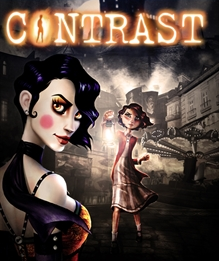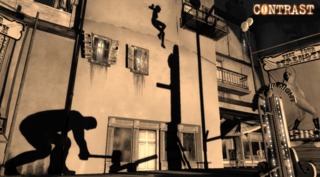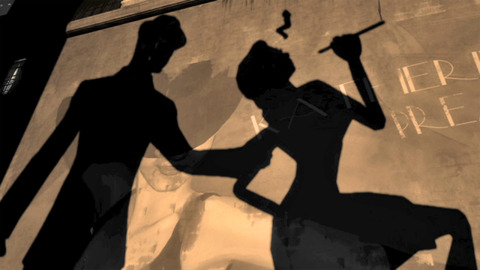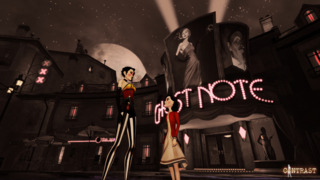My Thoughts on Contrast
By Wess 4 Comments

The concept of light and dark, and the interplay between those, are fairly commonplace in the world of video games, and these terms can hold a lot of different meanings. Various Nintendo games (in addition to others) often feature two parallel worlds, one referred to as “light” and the other “dark”, such as in The Legend of Zelda: A Link to the Past and Metroid Prime 2: Echoes. In these examples the “dark world” is a different take on the same physical area, where every area is more oppressive, dangerous, and, well… dark. The Zelda series as well as many others also often make use of “light puzzles”. These typically involve creating and/or redirecting sources of light in order to achieve some effect, such as blowing a hole in a wall to allow light into a dark room, and then positioning a mirror to reflect the light onto a surface that will react in some way. Light and dark are also often and easily tied into thematic ideas of good and evil, as well as used in a more literal sense, such as in stealth games where staying in the dark keeps your character more well hidden. Of course, there is also the example of the horror game Amnesia: The Dark Descent, where having your character in darkness effectively damages you, and many horror games use very limited lighting to increase the feeling of fear and confusion in their atmospheres. Yet another example of light and dark is the fantastic indie puzzle/platformer Closure, where light defines reality - meaning that if an object does not have a light shining on it, it does not exist.
Contrast is another game I played recently that centered much of its core around the interplay between light and dark. In this title the player controlled character Dawn can shift between being in the normal 3D world, with full range of movement, into shadow. Essentially any surface that is sufficiently illuminated can be shifted into, making Dawn exist as a shadow on that surface, which also shifts the gameplay from 3D movement to 2D. Shadows cast by other objects onto the wall will act as platforms in your 2D shadow world, and this is what makes up almost all of the gameplay in Contrast. In this short adventure consisting of 3 roughly hour long Acts, you will be asked to shift between 3D and 2D while platforming across objects and their shadows. In some instances this will be large pieces of moving machinery, and in some cases the shadows of people in the world as they animate during dialogue or some kind of performance. Other times you will need to move objects yourself, reposition a light source, or maybe both, in order to create the platforms you will need as a shadow to reach your goal.

This is a neat concept and yet another to add to the long list of new ways to use light and dark to create gameplay. The puzzles and environments are never very challenging or intricate, but they never got stale to me either. The real issue with Contrast’s gameplay is just that the movement controls can feel kind of sloppy and fidgety, especially when trying to make your way as a shadow through a moving environment. All too often the game wants to force you back out into the 3D world when you collide with other shadows, often meaning you have to start the sequence over again, which actually makes the short and fairly simple challenges somewhat helpful, so that it doesn’t become overly frustrating. Ultimately from a gameplay and mechanics standpoint, Contrast manages to be a neat idea with some cool sections, but not polished enough to be called great.

I still enjoyed playing through Contrast, despite its flaws. Visually it is pretty different and interesting - set in the 1920s in a dark, noir themed city, it manages to be both beautiful and harrowing. You pretty quickly realize that there is something very different about Dawn and the real main character of the game - a little girl named Didi. Didi is able to see and interact with Dawn, but nobody else can. Didi can also interact with her family and the other “normal” people of the city, while Dawn can only see their shadows. That’s not the only thing that immediately struck me about Didi’s situation though - it becomes very clear that her family life is anything but stable. The interactions between her and the members of her family are actually quite well voiced, although often written with too heavy a hand, but it definitely put me in a place as a player where I wanted to help Didi, but at the same time felt that helping her now was only going to lead to more pain later. She is either very oblivious to the problems with her parents, or very naive about their ability to change for the better, as it becomes more and more clear that there is probably not a happy ending for them. Seeing her ignore the big issues and solely focus on trying to pull her family back together is both endearing and kind of heartbreaking.
Ultimately though, a lot of the potential for how the game could have ended doesn’t actually surface before the credits roll. The final segments of the game divert the attention away from the family’s problems somewhat, and the path points the player towards more questions about Dawn, and what she really is. Just as the game finishes asking these questions, it drops the final line of the game, giving a somewhat satisfactory answer, and then cuts to black. Clearly the intention is to give the players just enough to feel that they got an answer, without spelling very much out for them, I assume so that we could come to some conclusions of our own. We are mostly left with some half answers and shaky hopes about the past and future of all the characters involved, and maybe that is enough. Even though I feel that the game might be expecting me to have a more positive idea of what the future holds, I’m mostly comfortable with the idea that I can finish the story in my head.

I won’t defend Contrast’s imprecise platforming, or its occasionally on the nose dialogue. There are too many imperfections here in general to call Contrast a great game. I will say, however, that there are quite a few interesting ideas to be found, both in gameplay, setting and storytelling, that kept me engaged throughout. There is something very simple and natural, yet beautifully complex and otherworldly about Contrast’s use of exaggerated light and shadow, and the story it tells is dark, depressing, and also hopeful.
If you played Contrast or have any thoughts, I'd love to hear other opinions! I know the general reception to this game was not so great, but I found there was still quite a lot to like, and was glad I played it.
